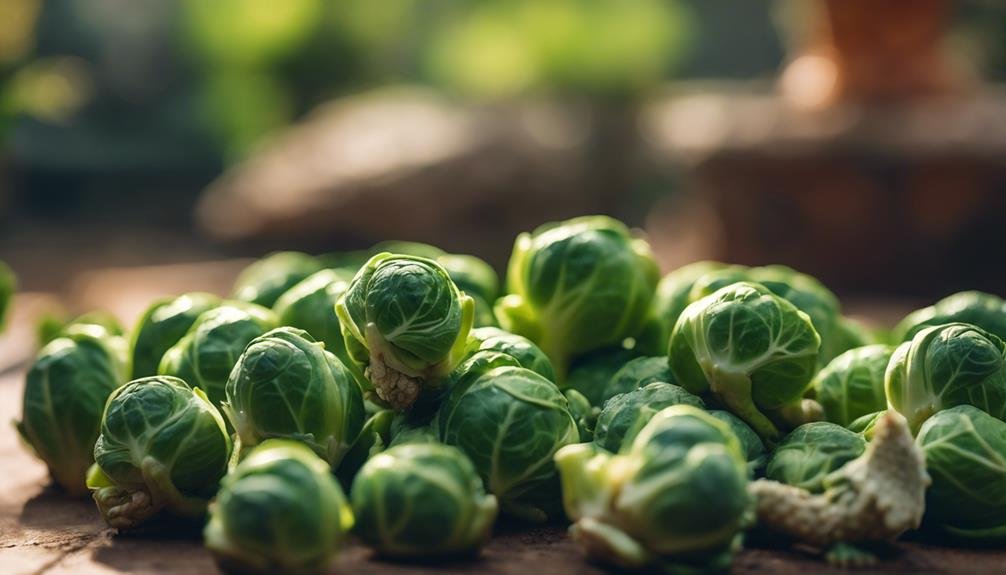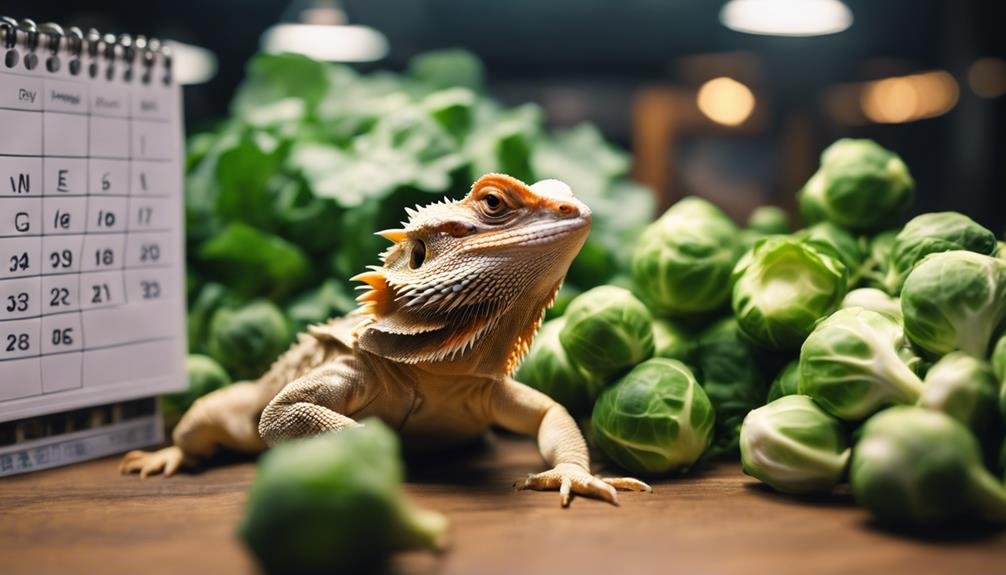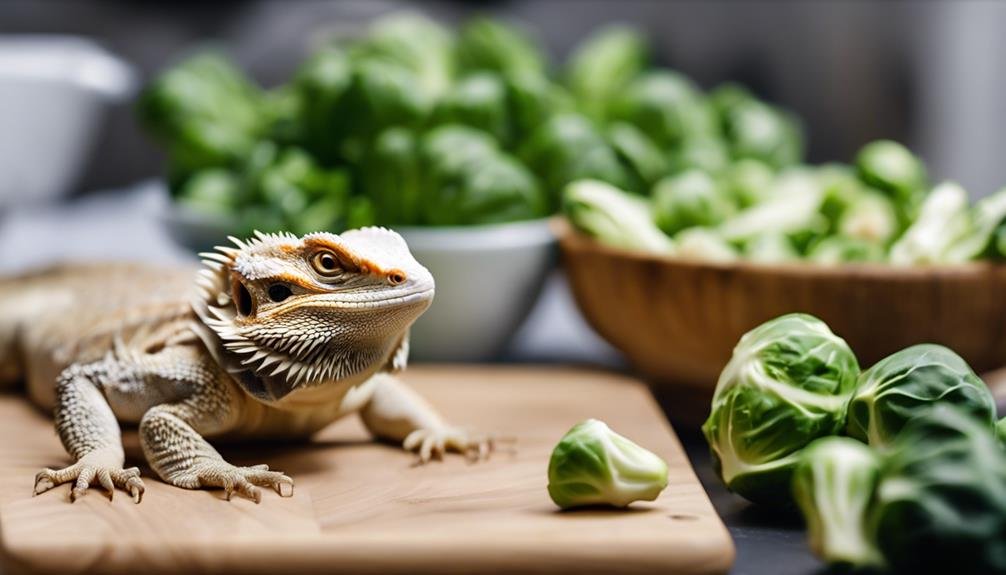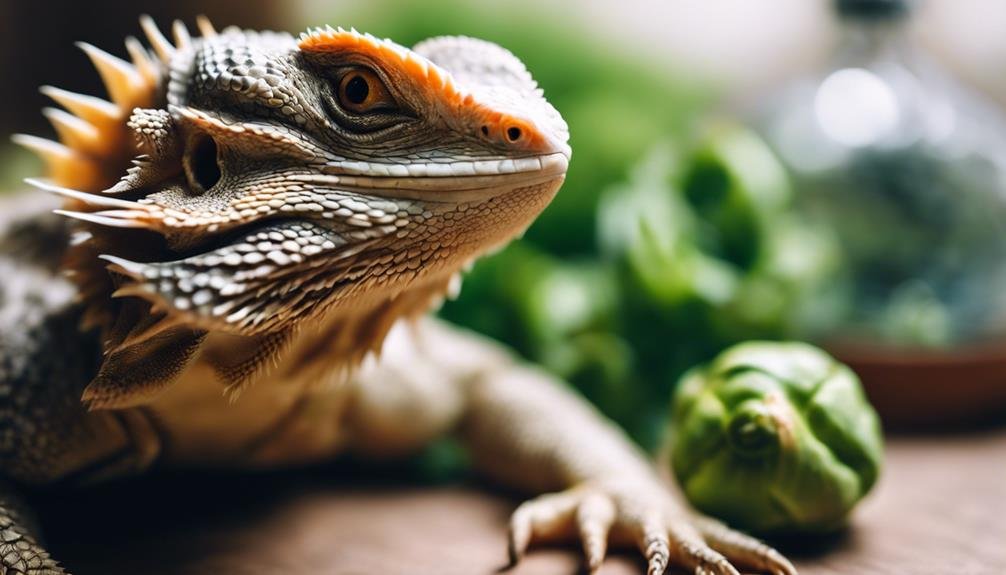You might wonder if Brussels sprouts are a suitable addition to your bearded dragon’s diet. While these tiny cabbages offer valuable nutrients like antioxidants and vitamins, they also come with potential risks, such as high oxalic acid content, which can interfere with calcium absorption. Proper preparation and moderation are key, but what exactly does that entail? Before you decide to add Brussels sprouts to their menu, it’s important to understand the full scope of benefits and risks involved. So, how can you guarantee your bearded dragon gets the best of both worlds?
Key Takeaways
- Bearded dragons can eat Brussels sprouts in moderation as part of a varied diet.
- Brussels sprouts are rich in antioxidants, fiber, Vitamin C, and Vitamin K.
- Overfeeding Brussels sprouts can cause gastrointestinal upset and nutritional imbalances.
- Serve Brussels sprouts raw or lightly cooked, chopped into small, bite-sized pieces.
- Rotate Brussels sprouts with other vegetables like bell peppers and zucchini for a balanced diet.
Nutritional Benefits of Brussels Sprouts


Brussels sprouts are packed with essential nutrients like antioxidants, fiber, Vitamin C, and Vitamin K, which can greatly benefit your bearded dragon’s health. When bearded dragons eat Brussels sprouts, they get a nutrient-dense snack high in vitamins. These vitamins are important for maintaining a robust immune system, promoting efficient digestion, and supporting bone health—key aspects of your dragon’s overall well-being.
Brussels sprouts contain antioxidants that help combat oxidative stress, potentially reducing your bearded dragon’s risk of chronic diseases. Vitamin C is another powerhouse, bolstering the immune system and absorbing other important nutrients. Fiber, conversely, ensures smooth digestion and could contribute to heart health by maintaining a balanced diet.
One of Brussels sprouts’ most significant benefits is their Vitamin K content. This vitamin is essential for proper blood clotting and bone strength, which is particularly important for avoiding calcium deficiency. Calcium deficiency can lead to severe issues like metabolic bone disease, so a diet high in nutrients like Vitamin K can be highly beneficial.
Risks of Overfeeding Brussels Sprouts
Feeding your bearded dragon too many Brussels sprouts can lead to gastrointestinal upset. Overfeeding these veggies can cause more harm than good. The high-calorie content can contribute to unwanted weight gain, making it harder for your pet to stay active and healthy. Additionally, Brussels sprouts can strip iodine from your dragon’s body, potentially leading to hyperthyroidism, a serious condition affecting thyroid function.
Moderation is important. Here’s a quick overview of what happens when you overfeed Brussels sprouts:
| Risk | Cause | Impact |
|---|---|---|
| Gastrointestinal Upset | Overfeeding | Bloating, diarrhea, discomfort |
| Weight Gain | High-calorie content | Obesity, lethargy |
| Iodine Deficiency | Brussels sprouts stripping iodine | Hyperthyroidism, poor thyroid function |
| Nutritional Imbalance | Excessive Brussels sprouts in the diet | Lack of variety in nutrients |
To ensure your bearded dragon remains healthy, it’s important to balance their diet and not rely too heavily on one type of food. Always consult your vet if you know the appropriate amount to serve. By doing this, you can avoid the pitfalls of overfeeding and keep your dragon thriving.
Frequency of Feeding Brussels Sprouts


When considering how often to offer Brussels sprouts, aim every couple of weeks or once a month to maintain your bearded dragon’s health. This frequency strikes a balance between providing variety and avoiding potential issues. While bearded dragons eat Brussels sprouts, they shouldn’t be a staple in their diet due to their nutritional profile.
Brussels sprouts are high in oxalic acid, which can bind with calcium and prevent its absorption. This can lead to calcium deficiency over time, posing a risk to your dragon’s health. To mitigate this, it’s important to feed Brussels sprouts sparingly and ensure they’re part of a varied diet that includes other vegetables, fruits, and insects.
Evaluate your dragon’s regular diet before you decide to feed Brussels sprouts. You might want to skip Brussels sprouts altogether if you’re already including other veggies high in oxalic acid. Each bearded dragon has unique dietary needs and preferences, so adjust the frequency based on what works best for your pet.
Ultimately, feeding Brussels sprouts occasionally can offer some benefits but should be done cautiously. By keeping their diet balanced, you’ll help your bearded dragon thrive.
Raw Vs. Cooked Brussels Sprouts
Understanding the differences between raw and cooked Brussels sprouts can help you decide what’s best for your bearded dragon’s diet. Raw Brussels sprouts retain more nutrients than their cooked counterparts, providing a richer source of vitamins and minerals essential for your dragon’s health.
However, raw Brussels sprouts contain goitrogens—compounds that can affect thyroid function if consumed in large quantities.
Cooking Brussels sprouts can reduce their goitrogen content, making them safer for your dragon to eat regularly. Additionally, some bearded dragons may prefer the taste or texture of cooked Brussels sprouts, making feeding easier for both of you.
Cooked Brussels sprouts can also be easier to digest, which might be beneficial if your dragon has a sensitive stomach.
When considering raw vs. cooked Brussels sprouts, it’s important to remember that both forms can be safe in moderation. Offering a mix of raw and cooked Brussels sprouts can provide a balanced approach, ensuring your dragon gets various nutrients while minimizing potential risks.
Always observe how your bearded dragon reacts to both forms and adjust their diet accordingly.
Preparing Brussels Sprouts for Bearded Dragons


To guarantee Brussels sprouts for your bearded dragon, chop them into small, bite-sized pieces to prevent choking. Once chopped, you can serve them raw or lightly cooked without oil or seasoning. Raw Brussels sprouts retain their nutrients, while cooking them can make them easier to digest.
When prepping Brussels sprouts, remember these key steps:
- Chop into small pieces: This prevents choking and makes eating easier for your bearded dragon.
- Serve raw or plain cooked: Avoid adding oils, salts, or seasonings that can harm your pet.
- Consult your vet: Always seek veterinary advice before introducing new foods to your dragon’s diet.
Brussels sprouts should be offered as an occasional treat rather than a staple in your bearded dragon’s diet. This ensures they get a varied diet rich in all the necessary nutrients.
Wash the Brussels sprouts thoroughly to remove any pesticides or contaminants.
Alternative Vegetables for Bearded Dragons
Bearded dragons can regularly enjoy a variety of alternative vegetables, such as bell peppers, butternut squash, and zucchini, to guarantee a well-rounded diet. These veggies offer essential nutrients like beta-carotene, Vitamin C, and fiber, which are important for your pet’s overall health.
While Brussels sprouts can be a part of their diet, rotating them with other vegetables helps provide a diverse intake of nutrients.
In addition to bell peppers, butternut squash, and zucchini, consider incorporating sweet potatoes, green beans, and snap peas into your meals. These vegetables provide a mix of flavors and textures that keep your bearded dragon interested in their food. Sweet potatoes are rich in beta-carotene, while green beans and snap peas offer good fiber.
Remember leafy greens! Collard greens, mustard greens, and dandelion greens are excellent choices that can be mixed with other veggies. These leafy greens are packed with vitamins and minerals, contributing to a balanced diet.
Signs of Dietary Issues


Recognizing signs of dietary issues in your bearded dragon is essential for maintaining their health and well-being. Bearded dragons need a balanced diet to thrive; any deviation can lead to noticeable health problems. Watch for signs like weight loss or gain, lethargy, abnormal stool consistency, and changes in appetite. These can be early indicators that something’s not right.
Disinterest in food, refusal to eat certain foods or selective eating can also hint at dietary problems. High phosphorus levels in your bearded dragon’s diet can contribute to calcium deficiencies, leading to serious health issues like metabolic bone disease (MBD). Symptoms of MBD include tremors, weakness, and bone deformities. Monitoring these signs is essential to intervene early.
To help you stay vigilant, keep an eye on these specific behaviors and conditions:
- Weight fluctuations: Sudden weight loss or gain.
- Behavioral changes: Increased lethargy or disinterest in usual activities.
- Appetite alterations: Sudden changes in appetite, including refusal to eat.
Bearded dragons need consistent monitoring of their eating habits, weight, and overall behavior. Promptly addressing any signs of dietary issues can help ensure your pet remains healthy and happy.
Conclusion
Feeding your bearded dragon Brussels sprouts can be beneficial, as they offer antioxidants, fiber, and vitamins. However, due to their high oxalic acid content, it would be best to give them sparingly.
Always chop them into small pieces and serve raw or lightly cooked without seasoning. Monitor your pet for any dietary issues and consult your vet for guidance.
Doing this guarantees your bearded dragon’s health and happiness while enjoying a varied diet.

